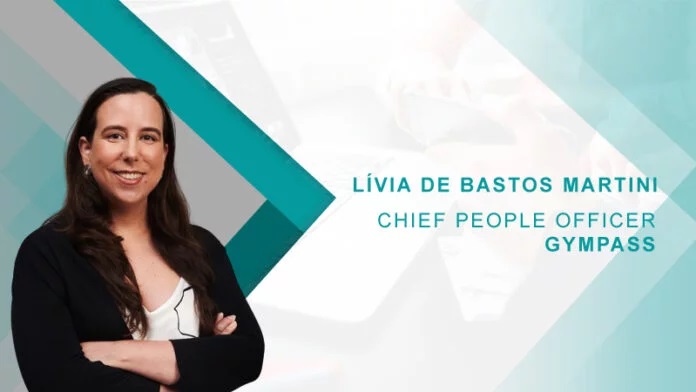HRTech Interview with Lívia de Bastos Martini, Gympass Chief People Officer

Strong 8k brings an ultra-HD IPTV experience to your living room and your pocket.
Please share a few words about yourself and your role as the Chief People Officer at Gympass.
As Chief People Officer at Gympass, the corporate wellness platform on a mission to make wellbeing universal, I work to ensure the company and our people thrive. That happens in many ways: from attracting and retaining top talent, to upskilling leadership and ensuring employees maintain engagement, ensuring the right people are tasked with the right problems and that business priorities are aligned with people’s mission and skills. I also guarantee that the structures, policies and tools we have support our 1,700 employees to pursue their wellbeing – mentally, physically and emotionally.
What motivated you to move into the talent management or HR space?
My background actually began in investment banking and management consulting, working for McKinsey & Company and Banco Santander. However, it was my passion for operations and fostering connections across distance and language barriers, as well as the company mission that led me to Gympass in 2017.
I began at the company as Head of International Operations, supporting all local teams across 14 countries and shortly thereafter became CFO and Head of Global Operations By understanding more of the company, I saw a great opportunity for the People function to take a step forward into a very strategic business enabler and a powerful force towards employee wellbeing, so about 18 months in, I took on my current role as Chief People Officer. It’s inspiring to see the power of an engaged and committed group of talent, and being able to oversee a company with this mission empowers me to continue to drive change.
Brief our audience about Gympass and how it is revolutionizing global well-being.
Leaders are beginning to realize that Investing in employee wellbeing is investing in company performance.
Employees are increasingly demanding that employers prioritize their wellbeing. According to our Work Life Wellness study, which surveyed 9,000 employees; 4 out of 5 ranked salary just as important as wellbeing and 3 out of 4 participants stated that they would quit a company that did not support their wellbeing. This shift in employee expectations is indicative of a changing workforce, where the importance of wellness benefits is influencing attitudes at work.
More than ever, employers recognize their responsibility to offer solutions and resources to their employees and Gympass has built the most loved corporate wellness platform, offering the largest network of gyms, classes, personal trainers, and wellness apps – all in one employee subscription.
Wellbeing is a vital part of talent acquisition, retention, productivity, culture and ultimately a cost-saving tool that is critical to company performance. Gympass customers have happier, healthier, and more productive workforces that are 40% less likely to turnover and save up to 25% on healthcare costs.
In our Return on Wellbeing study, we found that the vast majority of companies that measure the impact of their wellness program say it is very important or extremely important for employee acquisition (78%), satisfaction (88%), and retention (79%).
What is the most important aspect of employee well-being that you focus on at Gympass?
The reality is there is no one-size-fits-all approach to wellbeing, so there’s no one “most important aspect” to focus on. The key is building a holistic program that gives employees access to the resources and tools that fit into their lives.
Today, employee wellbeing goes beyond just physical fitness and Gympass is committed to connecting employees with the offerings that support their mental, physical, and nutritional health. With over 50,000 partners ranging from brick-and-mortar gyms and online fitness classes to meditation apps and sleep support, our company is committed to fostering 360-degree wellness.
We also focus our policies, processes and culture around flexibility, empowerment and accountability to ensure that employees are able to take full advantage of our product and care for their wellbeing when and how best works for each one of them.
How has Gympass utilized technology to implement employee well-being programs?
The dynamics of the workplace have changed and our approach to maintaining our wellbeing has evolved. With employees scattered more than ever, there is a growing need for convenience and accessibility.
When the COVID-19 pandemic hit in 2020, our company identified this shift early on. And began to pivot the business by focusing primarily on growing our digital catalog of fitness, meditation, sleep, and nutrition apps. We’ve grown our digital category by ~600%, driving a collective ~800% increase in user check-ins across our Mind and Life categories. We’ve worked with our team of global partners, such as Thrive Global, Headspace, and our own online training platform, Traniac, to provide access and tools to employees around the world, no matter where they are or what their daily life looks like.
At Gympass, we recognize the power of technology in cultivating a sense of community, particularly since our employees are located in over 10 countries worldwide. To nurture our culture and reinforce our shared passion for our mission and company values, we regularly organize team activities and challenges that employees can actively engage in.
How do you measure the success of your employee well-being programs? What metrics do you use?
At Gympass, we have constantly worked on initiatives based on employee feedback to build the culture and the company that is right for us. As a result of these efforts, including a fully subsidized Gympass plan for all employees, our voluntary attrition has gone down by over 50%, and is now at an all time low.
In our Return on Wellbeing study, we surveyed over 2,000+ HR leaders around the world and found that 90% of the companies that measure their wellness program’s return on investment see a positive return — the same rate at which they report positive returns from their overall benefits programs.
We also have proof of success when we asked about expenditures – 78% of respondents in our study said their wellness program reduced their health care costs. Additionally, 85% of HR leaders in the study said it decreased the cost of talent recruitment, retention and/or engagement and 85% report decreased utilization of sick days.
To calculate ROI of wellness programs, we’ve developed a straightforward formula. By calculating the sum of productivity increases, talent management savings, and healthcare savings, and subtracting the costs of wellness programs, your company can find the true value of wellness programs amongst your employees.
What are some challenges that you have faced while implementing these programs, and how have you addressed them?
Proving wellness programs are a necessity and not just a “nice-to-have” can certainly be challenging, however, we’re seeing a major shift in the way both employees and employers think about wellness.
From our Return on Wellbeing study, we uncovered that 9 out of 10 HR leaders see wellness programs as a competitive advantage. In fact, 100% of HR leaders say wellness programs are important for employee satisfaction, with 98% of HR leaders seeing an improvement in employee satisfaction after rolling out a wellness program, and 63% noting it had a very positive or extremely positive impact.
On the employee side, there is no “right way” to increase the wellbeing of your workforce. Instead, the idea is to give them the tools they need to prioritize their overall health, and empower them with the mindset to do so. Wellbeing is more than just working out or meditating – it’s a combination of physical health, mental health, nutrition – this is backed up by all of the latest research. However, individuals need to take charge of their journeys and invest time and energy into this – with the right level of support from their employer and the right solution to guide them on that journey. This is why Gympass is designed to be as flexible and adaptable as possible for all employees, effectively lowering the barrier to entry for anyone who wants to prioritize their physical and mental health.
Read more @ https://hrtechcube.com/hrtech-interview-with-livia-de-bastos-martini/
Note: IndiBlogHub features both user-submitted and editorial content. We do not verify third-party contributions. Read our Disclaimer and Privacy Policyfor details.


